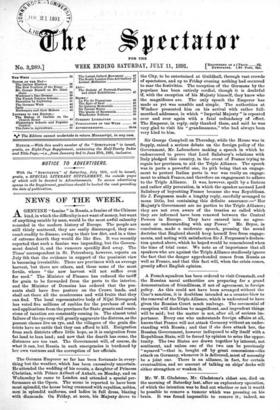Sir George Campbell on Thursday, while the House was in
Supply, raised a serious debate on the foreign policy of the Government, Mr. Labouchere making a speech in which he endeavoured to prove that Lord Salisbury's relations with Italy pledged this country, in the event of France trying to regain her provinces, to aid the Triple Alliance. The speech was in parts a powerful one, its pith being that an engage- ment to protect Italian ports in war was really an engage- ment to attack France, and therefore an engagement to adhere to the Triple Alliance. It was, however, spoilt by a furious and rather silly peroration, in which the speaker accused Lord Salisbury of boycotting France because she was Republican. Sir J. Fergusson made a lengthy reply, carefully arranged to mean little, but containing this definite assurance :—" Her Majesty's Government are no parties to the Triple Alliance ; they are not even aware of the treaties so called which they are informed have been renewed between the Central Powers in Europe. They have entered into no agree- ment or understanding with any Power." Mr. Bryce, in conclusion, made a moderate speech, pressing the sound doctrine that England should keep herself free from engage- ments, and noting with satisfaction Sir J. Fergusson's declara- tion quoted above, which he hoped would be remembered when the time of trial came. We note as of importance that all speakers who are against the Triple Alliance studiously ignore the fact that the danger apprehended comes from Russia as well as France, and that this fact will, when the crisis comes, greatly affect English opinion.


































